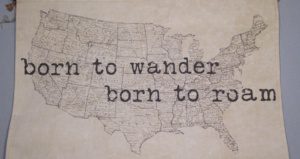By: MJ + PJ
You will need a passport to travel the world. Just sayin’. Probably the number one item required.
There is land, and there are bodies of water. The water keeps land things nicely separated but can be very costly to cross, so the less continents re-visited the more economic you will be on your journeys.
A visa is the number two ‘access pass type of thing’ to consider and manage: Some countries have reciprocal agreements with their respective citizens, and this applies to several developed nations and to some of the Commonwealth nations. Europe has the Schengen visa. So you may not need one for some destinations… but one should not make assumptions on this type of thing. You’d best check ahead for each target destination as it can take more than a week to obtain a visa or a in-person visit. You cannot assume it will be issued electronically, but many can be.
Security awareness is something that should always be in “on mode”. It is something you should talk to your children about – preferably pre-emptively, and with everyone ‘knowing the drill’ if something were to happen.
Visit the website of the Central Intelligence Agency for great summary information for countries. See the drop down menu on the right of that page for a country list.
Visit the embassy website for your home country to get information and travel advisories specific to your citizenship. For example, the US Department of State
It is a great idea to read travel guides (pick them up locally on arrival, rather than buy form a retail bookstore (who want’s to carry these from place to place?) in print/book form for tips on security.
It is a great idea to talk about local security with reputable people you encounter. You are on your own to define and decide upon them.
The unexpected is something that goes down and no one was really anticipating it, but it happened so you have to deal with it. While you may not know exactly what to do, you should have some strategies on hand. Use those. This is a case by case scenario type of problem.
And in case there is a problem, someone needs to know where you are going and what you are planning to do. This is where you have to have your point people who are notified ahead of your plans. It is a great idea to also tell your embassy where you are heading and when, but in more general terms.
Another technicality is the language barrier. Universal gestures and expressions can only get one so far, but they are a great start to sorting out what you need.
Probably most important after getting that passport and visa is realizing that your culture is just that: yours. If you don’t notice both the benefits and deficiencies of your culture when immersed in another culture, then why did you even leave home? Culture comparisons are best discussed behind closed doors, and with a pretense of curiosity.

